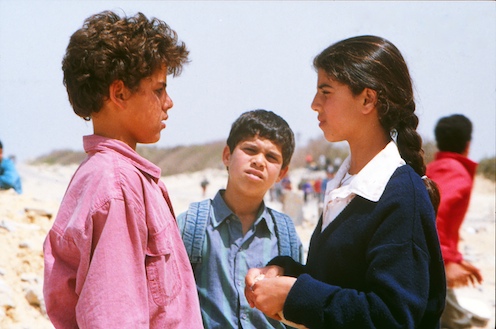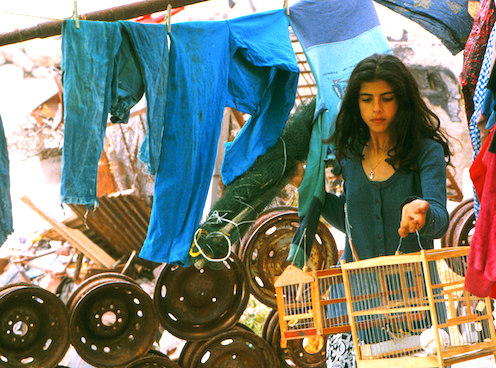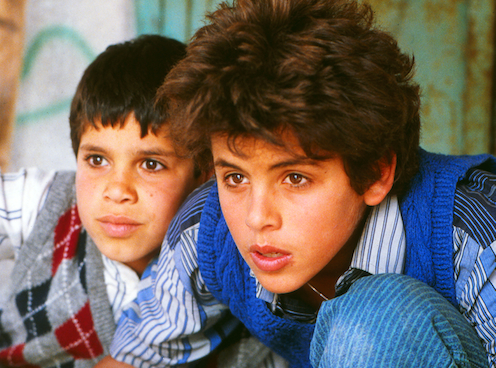Tale of the Three Jewels
Full Description
A mixture of realism and allegory set against the backdrop of the Palestinian uprising in Gaza, TALE OF THE THREE JEWELS is the story of Youssef, a 12-year-old Palestinian boy who tries to win the love of Aida, a beautiful Gypsy girl. Aida offers her heart on the condition that he find her grandmother's lost jewels. Youssef is so smitten with Aida that he embarks on a mystical pursuit that leads him to a wise old man, a mysterious scroll, death, and resurrection. Youssef's father is in prison and his brother a fugitive from the Israeli army. Yet, despite the violence and fear all around him, Youssef lives submerged in his imagination, often escaping the refugee camp to be with Aida in the sunny Gaza countryside. Nazareth-born writer and director Michel Khleifi (WEDDING IN GALILEE, JFF 1988) is the preeminent chronicler of the Palestinian experience, himself currently living in exile in Belgium. With this film, Khleifi aims to detach from the terror and humiliation of the occupation with a hopeful story of young love. TALE OF THE THREE JEWELS is also notable as the first feature film shot entirely in Gaza, with production completed shortly before the Israeli Army began to withdraw under the agreement on Palestinian self-rule. The cast includes famed Palestinian actors Makram Khouri as the wise old man and Mohammad Bakri as Aida's father. 1995 Cannes Film Festival.
Filmmaker Bio(s)
Michel Khleifi was born in Nazareth in 1950. In 1970 he travelled to Belgium where he studied television and theatre directing.
His films include: FERTILE MEMORY (1980), MA'LOUL CELEBRATES ITS DESTRUCTION (1985), WEDDING IN GALILEE (1987 - International Critics Prize, Cannes 1987), CANTICLE OF THE STONES (1990), L'ORDRE DU JOUR (1993), and TALE OF THE THREE JEWELS (1995).
"There are 6,000 mixed-faith couples out in the open and an estimated additional 6,000 couples who live together in descretion" Reported Michel Khleifi in response to audience questions at the Castro. "We all seek for something that liberates us. Movies are based on codified systems like the societies we live in. I like filmmakers that break these codes and go beyond them."
"In FORBIDDEN MARRIAGES, our aim was to confront these couples' stories with the religious marital codes of each of the three monotheistic faiths in order to show the Middle East's urgent need for a civil code of marriage which liberates the individual from all religious constraints and gives her / him the freedom to choose."
On "Tale of the Three Jewels," he said: "To dream of making a film in Gaza with the people of Gaza in their daily reality; to look closely in order to unveil the magical reality of this strip of land where so much humiliation has accumulated, so much terror and violence, hatred and passion, strength and fragility, so much reality and myth..."
"What a more beautiful way to recount all this than through a tale of today which breathes not only juvenile love but also the earth, the sun, the orange-groves, and the sea: all wonderful elements which are essential to pay tribute to the simple people, to defend them as well as life itself against the political and military ideologues who continue to hold them captive."
"I wanted to be a Volkswagen mechanic. Not just any mechanic - but a specialist." Told Director Michel Khleifi of his filmmaking carreer. "We shot TALE OF THE THREE JEWELS after the Oslo accords and before the Israeli army pulled out of Gaza. There were areas in Gaza where the amry did not enter. The day after the we arrived with the film crew there was an explosion in Jerusalem. We started shooting on a Thursday and on Friday the Hebron Massacre took place. The country was in uproar; curfews, demonstration, deaths. The film schedule was cancelled and for 3 weeks I doubted our ability to shoot at all. Just to travel 2 or 3 miles was an adventure. Little by little we decided to stay and make the film in Gaza because it could be made ONLY in Gaza. By then were considered mad and known by the locals as 'The Fools'.
It is impossible to do a film like this with a crew of 30-40 people in secret. So the film script was submitted to the Israeli army from the start. The army said we can't film any scene with weapons or demonstrations. I would have liked to shoot some scenes differently. For example, we filmed one scene with weapons anyway, when the four young men are killed, and we had to 'steal' the images; that is why the camera in that scene is running."
"We found the main actor, Yusef, by chance. We auditioned hundreds of boys. By accident, my assitant had a flat tire and stopped in a garage to fix it. Yusef was working there. During the Intifada, an Israeli soldier broke the boy's arm. Several months later a Palestinian teacher beat him very severly. He then became almost autistic to the point where he lost the capacity to read and write. We worked with him to memorize his lines orally."
"Under all these conditions, we realized how important it was to start and FINISH a project in Gaza. We were fully supported by the people of Gaza. It was difficult and at the same time magic." The film screened in Jerusalem, Ramallah, and Nazareth in semi-private screenings. I also screened the film twice in Gaza, each of these two times while under a complete closure by Israel; once before the elections and once after them."
Director(s)
Country(ies)
Language(s)
w/English Subtitle
Release Year
Festival Year(s)
Running Time
112



